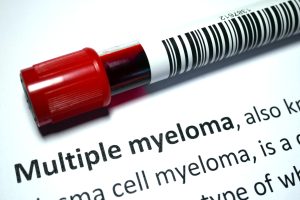
24 RCCA Physicians Named to 2025 Castle Connolly ‘Top Doctors’ List for Exceptional Cancer Care
A cancer diagnosis can be frightening. An individual may worry about how, or if, they will get better. The future becomes unclear and the strain
HIPAA Alert: Potential Data Breach Learn More
Questions on Oncology, Hematology and/or Infusion Clinical Services due to COVID-19 Crisis – CALL 833-698-1623
Important Information for Our Patients Regarding the Coronavirus.
RCCA Providing Area Cancer Patients with Access to Care During Coronavirus Outbreak
RCCA Offering Patients Virtual Visits During Coronavirus Pandemic
Prostate cancer affects more American men than any other cancer, with the exception of skin cancer. In addition to the impact of the cancer itself, men may experience side effects of treatment that diminish physical function and quality of life. Because prostate cancer affects the reproductive system, a common side effect of prostate cancer treatment is sexual dysfunction. However, there is good news—research suggests that exercise can help improve sexual function after prostate cancer treatment. Learn more from the medical oncologists and hematologists at Regional Cancer Care Associates (RCCA).

The nerves and blood vessels that play a role in a man having an erection are very delicate. Although urologists have made great progress in developing nerve-sparing approaches to radical prostatectomy – the surgical removal of the prostate gland – erectile dysfunction remains a potential adverse effect of the surgery. Radiation therapy to the prostate also can cause erectile dysfunction in up to one-half of patients. Meanwhile, men can experience diminished libido, reduced penis size, and erectile dysfunction after starting androgen deprivation therapy (ADT), a hormonal treatment given to reduce levels of testosterone, the male sex hormone that plays a role in fueling prostate cancer. In summary, prostate cancer treatment can adversely affect:
While the potential impact of prostate cancer treatment on sexual function can be daunting, there’s also encouraging news on this front. That news includes findings from a long-term clinical trial led by the Exercise Medicine Research Institute (EMRI) at Edith Cowan University. EMRI Director and study lead Daniel Galvao presented the results of the trial at the American Society of Clinical Oncology Breakthrough meeting in Japan in 2023.
Galvao acknowledged that many men with prostate cancer have concerns about their sexual health. He also acknowledged the significant impact of sexual dysfunction, which has both physical and psychological effects on men. He went on to explain that the study he and his colleagues conducted documented the benefits of supervised exercise for enhancing sexual health in patients who have been treated for prostate cancer.
The clinical trial spanned four years and studied more than 100 patients with prostate cancer. Researchers split patients into three groups:
Patients who underwent psychosexual therapy did not experience significant improvement in erectile function or have more satisfaction during sex. Those who completed an exercise component with their treatment reported improved in both erectile function and satisfaction during sex.
The study also documented additional benefits from exercise during or following prostate cancer treatment. The study found that participating in a supervised exercise program can boost upper and lower body muscle strength and help with weight regulation compared to standard care. Exercise also had a psychological impact—regular exercise supported greater physical strength and self-reliance.
Galvao noted that more research is needed to fully understand the impact of exercise on patients with prostate cancer, particularly regarding their sexual health. However, these findings have set a foundation, encouraging further research into the advantages of exercise for sexual function and enjoyment after prostate cancer.
Many healthcare providers already make exercise a component of their approach to providing cancer patients with comprehensive care. Based on the results of studies such as this one, exercise may figure even more prominently in efforts to address cancer patients’ treatment outcomes, overall health, and quality of life.
Common prostate cancer treatments potentially causing side effects include:
Exercise has been proven beneficial before, during, and after cancer treatment. While it can help patients manage common side effects of many cancer treatments, such as fatigue, it may also:
For patients with advanced prostate cancer, exercise is also helpful if undergoing androgen deprivation therapy (ADT). This hormone therapy may put men at a higher risk for diabetes, decreased muscle mass, osteoporosis, and weight gain, in addition to sexual issues.
The type of exercise most beneficial for patients with prostate cancer differs based on factors including their overall physical health, the type and stage of their prostate cancer, and their treatment regimen. For this reason, it is important for patients to consult their physicians and other healthcare professionals, such as exercise physiologists, before embarking on a new exercise program. In general, however, exercising can provide benefits at each phase of a patient’s treatment journey:
Being physically active before treatment often helps patients tolerate treatment better and recover more quickly from any adverse effects they experience. It also may reduce the possibility of complications from surgery and lower anxiety and feelings of distress in preparation for treatment. Many patients find they can sleep better and have more energy before treatment when they get sufficient exercise.
Once treatment begins, patients may need to adjust their exercise regimen to be less intense. The specific treatment, how far the prostate cancer has progressed, and an individual’s fitness level all impact the kinds of exercise a patient can safely engage in during treatment.
For instance, patients with an inactive lifestyle before starting treatment may need to begin with a low-intensity activity like taking short walks and keeping a slower pace. Meanwhile, patients who have the fitness level and medical clearance needed to engage in more vigorous exercise may consider activities such as:
As treatment side effects subside, patients generally can gradually increase the intensity and duration of exercise. Patients may find that low- or moderate-intensity exercise requires more effort after cancer treatment than it did before. As such, patients are encouraged to take their time and slowly reintroduce physical activity. Each patient should consult with his care team to determine which level of exercise is best for him during recovery.
These tips can help patients make the most of their exercise plans while managing prostate cancer symptoms and treatment side effects.
Patients should consult their physicians to identify the best approach to exercise. However, the American Cancer Society offers a Nutrition and Physical Activity Guideline for Cancer Survivors with general recommendations. For example, it suggests stretching and resistance exercises at least twice a week.
Overexertion can cause problems for active people, especially those undergoing or recovering from cancer treatment. Patients should exercise within their ability, paying attention to how their bodies react and recognizing when to take a rest. For instance, people should stop exercising if they feel dizzy or are losing their balance.
Multiple short bouts of exercise can be more effective than longer periods. This strategy also allows for gradually introducing longer and more-frequent exercise sessions. Patients should avoid exercising above a moderate level without consulting their doctors.
Preexisting conditions and other health concerns may limit exercise. For example, patients with heart or lung disease or severe fatigue should speak with their doctor before starting an exercise routine.
Patients using catheters should avoid swimming, as exposure to water might cause infections. Certain resistance exercises in water may also dislodge the catheter. For those with osteoporosis, heavy weights may put too much strain on the bone and cause breaks.
Additionally, patients should steer clear of specific exercises that may put them at risk of injury. People with balance problems or a lack of sensation in their feet are often more at risk for injury during exercise. These patients may consider asking their doctors about exercise strategies to lower this risk.
Patients who plan to go to a local gym for exercise should alert a loved one where they are and carry a cell phone in case of emergencies. If they are at elevated risk of infection because they are taking immunosuppressant medications or for other reasons, working out in a public gym may not be ideal until that risk is reduced.
Patients may also exercise at home. If patients have not exercised regularly before being diagnosed with prostate cancer, they want to ensure they have the right environment for physical activity. This includes an even surface to minimize the possibility of falls and adequate lighting.
If establishing a formal exercise regimen seems overwhelming, patients can instead seek to implement physical activity into their daily routines. Examples include:
Undergoing cancer treatment causes stress for many patients. Exercise is not just valuable for side effect management but also for enhancing quality of life. Exercise benefits all people, regardless of their health situation, improving physical, mental, and emotional health.
However, if exercise feels like a burden, it can have the opposite effect, creating more stress as patients manage other aspects of their treatment and life obligations. For these reasons, exercise should be fun. Patients can try out several exercises to determine which they enjoy most to ensure they stay physically active.
Patients with prostate cancer can experience greater peace of mind from knowing that they are receiving treatment from a compassionate care team skilled in all aspects of oncology. The medical oncologists and hematologists at Regional Cancer Care Associates provide the latest evidence-based therapies and comprehensive treatment for various cancers and blood disorders, with more than 20 locations in New Jersey, Connecticut, Maryland, and the Washington, D.C., area. Contact RCCA to learn more about prostate cancer treatment and sex after prostate cancer. Or schedule an appointment at one of the locations near you.
For more information or to schedule an appointment,
call 844-346-7222. You can also schedule an appointment by calling the RCCA location nearest you.

A cancer diagnosis can be frightening. An individual may worry about how, or if, they will get better. The future becomes unclear and the strain

Multiple myeloma (MM) is a rare type of blood cancer that often develops without early symptoms, making awareness of risk factors essential. Regional Cancer Care

A cancer diagnosis can bring a wide range of emotions, from fear and stress to sadness and hope. These feelings are a natural part of

Regional Cancer Care Associates is one of fewer than 200 medical practices in the country selected to participate in the Oncology Care Model (OCM); a recent Medicare initiative aimed at improving care coordination and access to and quality of care for Medicare beneficiaries undergoing chemotherapy treatment.